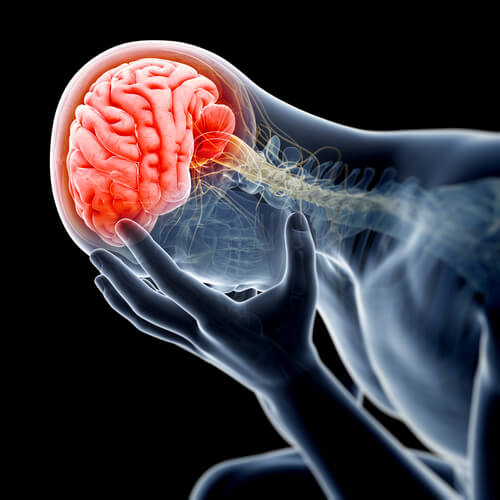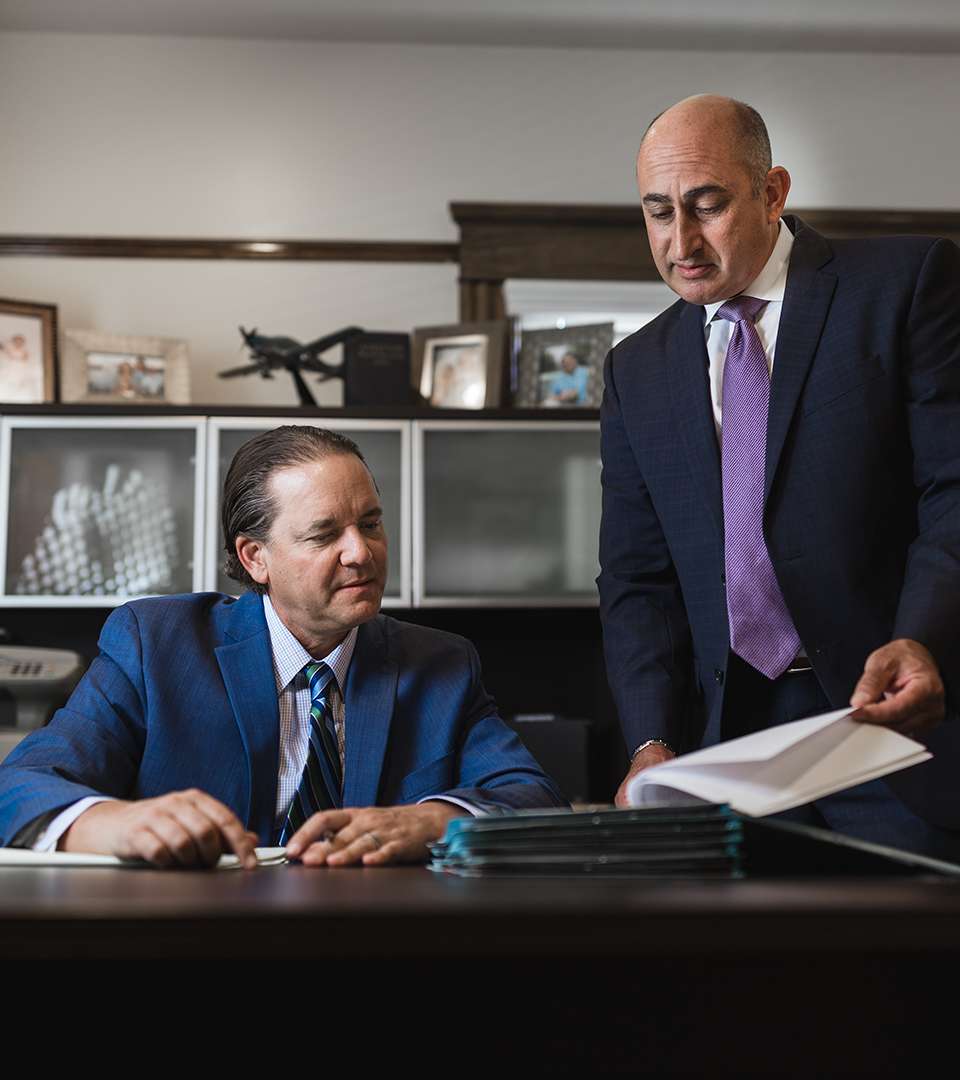
Brain Injuries
Fresno Brain Injury Lawyers
Helping TBI Victims Seek Justice & Fair Compensation
A brain injury is one of the most life-altering and devastating injuries a person can experience. The impact can be both immediate and long-lasting, affecting your physical health and your emotional, cognitive, and financial well-being. When your brain injury is the result of someone else's negligence, it can leave you feeling a mix of anger, confusion, and uncertainty about the future. The overwhelming frustration of knowing your life has been changed due to someone else’s carelessness. However, you don’t have to face this challenging situation alone. With Fowler | Helsel | Vogt by your side, you have a dedicated team committed to guiding you through every step of the legal process, fighting for the compensation you deserve, and helping you rebuild your life.
Have you or a loved one suffered a brain injury in Fresno? Call Fowler | Helsel | Vogt today at (559) 900-1280 or contact us online for a free consultation!
Why You Should File a Brain Injury Claim
If another person’s negligence caused your injury, you should not hesitate to pursue a brain injury claim. You will want to work with an attorney who treats these cases with the utmost care, including helping you file a claim and fight for the full and fair compensation you deserve.
You may be able to recover damages for:
- Medical expenses: Cost of all medical treatment, including hospital stays, surgeries, medications, rehabilitation, and ongoing medical care.
- Lost wages: Income lost due to the inability to work during recovery.
- Loss of earning capacity: If the TBI results in long-term or permanent disability that affects the victim's ability to work.
- Pain and suffering: Compensation for physical pain and emotional distress experienced due to the injury.
- Loss of enjoyment of life: Damages for the loss of ability to enjoy everyday activities and hobbies.
- Emotional distress: Compensation for any psychological impacts, such as anxiety, depression, and PTSD.
- Loss of consortium: Compensation for the impact of the injury on relationships with spouses or family members.
In some cases, punitive damages may also be awarded to a TBI victim if the defendant's actions were particularly egregious or malicious. These damages serve as a punishment and deterrent against future misconduct.
It's important to understand that the legal process can be complex. Professional guidance ensures that all aspects of your suffering are effectively presented, maximizing your potential compensation. From compiling evidence to negotiating settlements, having legal assistance can be crucial for navigating the intricacies of a brain injury claim.

Common Causes of Brain Injuries in Fresno
Any incident that causes trauma to the head can result in a brain injury.
Some of the most common causes of brain injuries in the U.S. include:
- Car accidents
- Truck accidents
- Bicycle accidents
- Motorcycle accidents
- Pedestrian accidents
- Slip and fall accidents
- Defective products
- Medical malpractice
Each of these causes can have unique legal implications, which underscores the importance of consulting a knowledgeable brain injury lawyer familiar with the specifics of TBI-related claims. Whether dealing with an insurance company or preparing for court, navigating the aftermath of a brain injury often requires specialized legal knowledge to ensure that your rights are fully protected.
If someone else's negligence caused your brain injury, call Fowler | Helsel | Vogt to speak with our brain injury attorneys in Fresno.
Car Accident TBIs: Who is Most at Risk?
Traumatic brain injuries (TBI) are serious and potentially debilitating injuries that commonly result from a car crash. The Centers for Disease Control and Prevention (CDC) estimates that each year more than 2.5 million people sustain a TBI, and nearly 50,000 of them die from their injuries. Here, we discuss some of the studies surrounding which groups may be more at risk of sustaining one of these injuries based on a few factors.
Influential Factors
- Back vs. front seat: A 2018 study looked at the risk of TBI based on seat position in a car crash. Researchers found that backseat passengers were at greater risk than those seated in the front seat, mainly when not using a seatbelt or other restraint device. Drivers had the lowest risk factor; however, mortality rates were significantly higher among those sitting in the front passenger seat.
- Age: Other research has shown that children are at a significantly high risk of sustaining a head injury in a motor vehicle accident. Children under 4 years old are particularly vulnerable. They are 8 times more likely to sustain an incapacitating injury if not properly restrained in an appropriate child safety seat, booster seat, or lap/shoulder belt system, depending on their age and size. For example, infants should be placed rear-facing until they reach two years old or until they outgrow the height or weight limits set by the car seat manufacturer.
Positioning within a vehicle and utilizing proper safety measures can dramatically affect the risk of TBI. Adults should ensure children are safely secured, and all passengers should be informed of the risks and precautions associated with airbag deployment, particularly with front-seat seating. This highlights the importance of comprehensive safety practices and awareness among drivers and passengers alike.
Although using the appropriate safety restraint is one of the most effective ways to reduce the possibility of sustaining a traumatic brain injury in a crash, it isn’t guaranteed, so drivers and passengers should remain cautious.
Types of TBI: A Comprehensive Guide
A traumatic brain injury (TBI) is a type of injury that occurs when there is sudden trauma or external force applied to the head, which results in damage to the brain. TBIs can range from mild to severe, and they can have a wide range of short-term and long-term effects on an individual's physical, cognitive, emotional, and behavioral functioning.
There are several common types of traumatic brain injuries, classified based on the severity and nature of the damage. These include:
Concussion
A concussion is a mild TBI that typically results from a blow to the head or a sudden jolt to the body. It may not always involve loss of consciousness. Symptoms can include headache, dizziness, memory problems, and sensitivity to light and noise. Most people recover from concussions with rest and time.
Contusion
A contusion is a bruise on the brain, often caused by a direct impact to the head. Contusions can vary in severity, and more serious contusions may require surgical intervention to remove the damaged tissue.
Coup-Contrecoup Injury
This type of TBI occurs when the force of impact is so strong that the brain moves within the skull, leading to injuries both at the site of impact (coup) and on the opposite side of the brain (contrecoup). It's common in high-velocity accidents.
Diffuse Axonal Injury (DAI)
DAI is a severe TBI caused by nerve fibers (axons) stretching and tearing throughout the brain. It often results from rapid acceleration or deceleration, such as in car accidents or shaken baby syndrome. DAI can lead to widespread brain damage and may have long-term consequences.
Penetrating Injury
Penetrating TBIs occur when an object (e.g., a bullet or a piece of bone) penetrates the skull and damages brain tissue. These injuries are typically severe and may require surgery to remove the foreign object and repair the damage.
Second Impact Syndrome
Second impact syndrome occurs when an individual sustains a second head injury before fully recovering from a previous one. It is a rare but hazardous condition that can lead to rapid and severe brain swelling.
It's critical for individuals engaged in contact sports or other high-risk activities to proactively manage the risk of a second injury by allowing adequate recovery time from any initial TBI and following medical advice regarding return to play or activity.
Hematoma
A hematoma is a collection of blood outside of blood vessels. In the context of TBI, there are three primary types:
- Epidural hematoma: between the skull and the outer membrane of the brain
- Subdural hematoma: between the brain and the dura mater
- Intracerebral hematoma: within the brain tissue
Hematomas can put pressure on the brain and require medical intervention.
If you have suffered any type of brain injury due to someone else's negligence, you may be entitled to compensation. Call our TBI lawyers in Fresno to learn more in a free consultation: (559) 900-1280.

Get the Facts About Brain Injuries
Recognizing the Symptoms of a TBI
Recognizing the symptoms of a traumatic brain injury is crucial for timely medical intervention and treatment. Symptoms can vary widely depending on the severity of the injury, but they generally fall into four categories: physical, cognitive, sensory, and emotional/behavioral.
Physical Symptoms
- Headaches: Persistent or worsening headaches.
- Nausea or vomiting: Repeated episodes.
- Fatigue or drowsiness: Unusual sleepiness or fatigue.
- Dizziness or loss of balance: Feeling unsteady or dizzy.
- Loss of consciousness: Ranging from a few seconds to a few minutes or longer.
Cognitive Symptoms
- Memory problems: Difficulty remembering new information or recalling past events.
- Confusion or disorientation: Feeling confused or having difficulty concentrating.
- Difficulty with attention: Trouble focusing on tasks or following conversations.
- Slowed thinking: Taking longer to process information or respond to questions.
Sensory Symptoms
- Blurred vision: Seeing double or experiencing visual disturbances.
- Ringing in the ears (tinnitus): Persistent ringing or buzzing.
- Sensitivity to light or sound: Increased sensitivity to bright or loud noises.
- Changes in taste or smell: Altered or lost sense of taste or smell.
Emotional/Behavioral Symptoms
- Mood changes: Uncharacteristic mood swings, irritability, or anxiety.
- Depression: Feelings of sadness or hopelessness.
- Sleep disturbances: Sleeping more than usual or having difficulty sleeping.
- Agitation: Restlessness or quickly getting upset or angry.
In addition to these core symptoms, patients may also experience a lack of energy or initiative in daily activities, known as apathy, which can significantly disrupt their personal and professional lives. Loss of problem-solving abilities and impaired decision-making can further impose challenges at work and home, affecting the individual's quality of life.
If you or someone you know exhibits these symptoms after a head injury, it's essential to seek medical attention immediately. Early diagnosis and treatment can significantly improve outcomes and reduce the risk of long-term complications.
Don’t let a brain injury change your life without the proper support. Call our Fresno brain injury lawyers now to discuss your case!
Traumatic Brain Injury Statistics
Brain injuries are some of the most severe injuries that the human body can withstand. Every day, many people are impacted because of TBI injuries. We gathered a few key brain injury statistics below:
According to recent studies, approximately 5.3 million Americans are living with a disability related to a TBI. The economic costs of TBI in the United States also reach over $76.5 billion annually, considering the medical costs and loss of productivity. These figures highlight the pervasive impact of TBI on individuals and the healthcare system, underscoring the importance of proactive measures to manage and mitigate the consequences.
Diagnosing the Severity of a Traumatic Brain Injury
Three general categories of brain injury severity are mild, moderate, and severe. To diagnose the severity of a patient’s brain injury, doctors will often use the Glasgow Coma Scale (GCS). This 15-point test assesses the patient’s ability to follow directions in three areas:
Eye-Opening Response
- Spontaneous (4)
- Reacting to verbal stimuli, such as commands (3)
- Reacting to pain only (2)
- No Response (1)
Verbal Response
- Oriented (5)
- Confused conversation but able to answer questions (4)
- Inappropriate words or responses (3)
- Incomprehensible speech (2)
- No Response (1)
Motor Response
- Obeys commands for movements (6)
- Purposeful movement to painful stimuli (5)
- Withdraws in response to pain (4)
- Flexion in response to pain (3)
- Extension response in response to pain (2)
- No response (1)
Once all three assessments are made, the doctor will give the patient a score of up to 15:
- Mild TBI: Score of 13-15
- Moderate TBI: Score of 9-12
- Severe TBI: Score of 8 or below
In addition to the GCS, imaging techniques such as CT scans and MRIs play a crucial role in diagnosing TBIs. These methods allow for detailed imagery of the brain's internal structure, revealing bruising, bleeding, or other trauma areas. Advanced diagnostic tools help formulate more precise treatment plans, enhancing recovery outcomes.
How Long Does It Take to Recover from a Brain Injury Fully?
The actual recovery time for a TBI will depend on several factors:
- The severity of the brain injury
- How long the victim was unconscious after sustaining the injury
- Whether or not the victim has access to quality medical care
- Whether or not the victim has a strong support system during their recovery
People with less severe brain injuries can still take months to heal, while those with more severe TBIs can take years to recover fully. Sometimes, a full recovery is impossible because the damage is too significant. No matter the severity of your injury or how long your road to recovery may be, our team is ready to stand by your side and fight for the compensation you need to get on the right track.
Recovery is about medical intervention and comprehensive rehabilitation programs focusing on cognitive, emotional, and physical therapies. Such programs can be tailored to address individual deficits, promoting a holistic approach to healing. Regular follow-ups and adjustments to these programs are necessary to accommodate any progress or setbacks during the recovery journey.
The Long-Term Effects of a Brain Injury
Victims of a brain injury may experience symptoms such as loss of consciousness, headaches, nausea, lack of coordination, sleep issues, and/or changes in behavior. However, symptoms of a brain injury can take days or weeks to appear. Even if you do not think you have a brain injury, it is essential to seek medical attention promptly after an accident so your doctor can administer a test.
Brain injuries can also lead to long-term complications, such as:
- Memory problems
- Attention and concentration deficits
- Executive functioning deficits
- Mood disorders
- Aggression and impulsivity
- Personality changes
- Motor deficits
- Sensory impairments
- Speech and language difficulties
- Seizures
- Sleep disorders
- Chronic headaches
- Cognitive fatigue
- Social and relationship challenges
Persistent therapy and support are often required for those suffering from these long-term effects, involving not only the patient but also their family and caregivers. Support groups and psychological counseling can provide significant benefits by offering emotional support and coping strategies for both patients and families dealing with the ongoing challenges of TBI.
The issues that arise from a brain injury may require extended therapy to treat.
Local Resources for Brain Injury Rehabilitation
Fresno offers numerous resources for individuals recovering from brain injuries, helping to provide comprehensive medical and therapeutic support tailored to specific needs. Facilities like the Community Regional Medical Center provide advanced care for traumatic brain injuries (TBI), including neuropsychological assessment and personalized rehabilitation programs. These programs are essential for aiding individuals in regaining their cognitive functions, physical capabilities, and emotional well-being, all vital for a return to daily life with minimized disruptions.
Additionally, organizations such as the Brain Injury Association of California offer support groups and information to both patients and families. They provide networking opportunities with others experiencing similar challenges, fostering a supportive community. This community engagement can be crucial in providing patients and their families with emotional support, practical advice, and access to additional services. Utilizing these local resources can significantly enhance recovery outcomes, offering a more integrated approach to managing the aftermath of brain trauma.
Frequently Asked Questions About Brain Injury Cases
What Should I Do Immediately After Suspecting a Brain Injury?
If you suspect a brain injury, seek medical attention immediately. Prompt medical evaluation is crucial to prevent potential complications. Document everything, if possible, including the incident details and witness contacts. This documentation can help preserve vital evidence that may be used in your legal representation later.
Is There a Time Limit to File a Brain Injury Claim in Fresno?
Yes, there is a time limit for filing a brain injury claim in Fresno, commonly known as the statute of limitations. Typically, you have two years from the date of injury to file your claim, though some exceptions may apply. It's imperative to act quickly and consult legal professionals to ensure a thorough understanding of your case timeline.
Can I Claim Compensation If I Was Partially at Fault?
Under the comparative negligence rule, you can still claim compensation in California even if you were partially at fault for the incident. Your percentage of fault will reduce your compensation. Consulting with a knowledgeable attorney can help clarify how this rule applies to your circumstances.
Contact Our Fresno Brain Injury Attorney Today
If you or a loved one has suffered a brain injury, contacting our TBI attorneys in Fresno, CA, can be your first step toward securing the justice and compensation you deserve.
We understand the profound impact such an injury can have on your life, and we are here to provide compassionate and effective legal assistance. Our firm offers free consultations to discuss your case and explore your options without financial obligation.
Additionally, we operate on a contingency fee basis, meaning you won't pay any legal fees unless we successfully recover your compensation.
Our attorneys know the latest developments in TBI-related litigation and utilize a detailed approach to investigate all aspects of your situation thoroughly. We are committed to offering personalized service that caters to each client's unique circumstances, ensuring you receive the attention and tailored advice necessary for a positive outcome.
Contact us today to schedule your free consultation and take the first step towards rebuilding your future!


.2308280955550.png)


